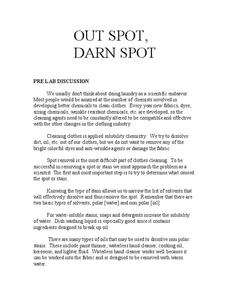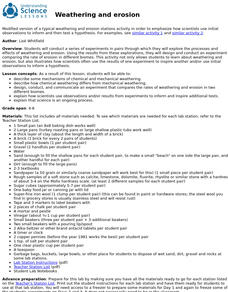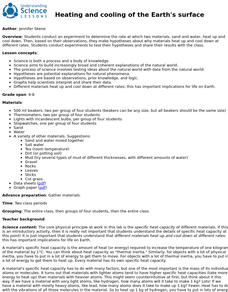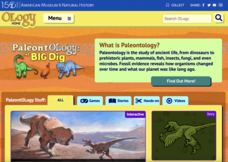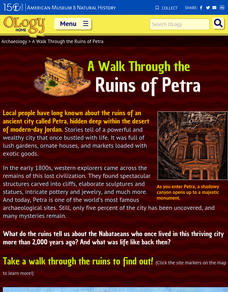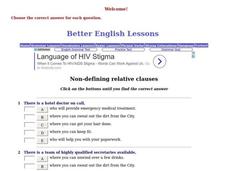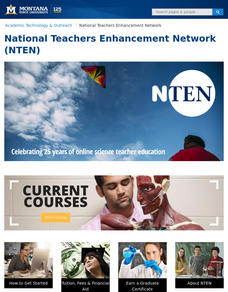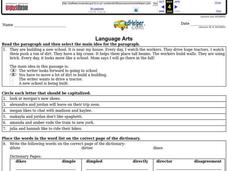Read Works
Trading Pumpkins
Can you imagine a pumpkin patch without pumpkins? Learners read how Tammy's family solves their problem in a cooperative way, followed by a set of 10 reading comprehension questions.
K5 Learning
Rocks
Five short answer questions follow an informational reading passage that details the three different types of rocks—sedimentary, igneous, metamorphic—and their rock cycle.
Channel Islands Film
Arlington Springs Man: Lesson Plan 3
Imagine being part of a team of scientists that discover the oldest human remains in North America. Imagine being part of the crew that documents this discovery. Class members get a change to be part of such an exciting adventure in a...
Polar Trec
Do Microorganisms Live in Antarctica?
Can microorganisms live in the dry, cold climate of Antarctica? Young scientists view a research project measuring microorganisms in the Taylor Glacier. They record the findings from dirty ice, clean ice, boots, sediment, and more. Then...
PBS
African American History: Climbing the Wall
Imagine the challenge of trying to trace your family genealogy if no records were kept of births and deaths. Where would you look for information? What types of documents could provide you with the information you seek? History...
Serendip
Out Spot, Darn Spot
Encourage your classes to be laundry helpers! Learners explore the chemistry of stain removal with a lab investigation. By identifying the components of the stain, they identify the most effective solute for its removal.
Great Books Foundation
Rattlesnakes
John Muir may be a friend to the natural world, but as a short reading passage confirms, he is no friend to rattlesnakes. As young readers learn about Muir's encounters with the dangerous creatures, they answer four comprehension...
Penguin Books
Addressing Text Complexity - Making Independent Reading Meaningful
Many English teachers dream of a classroom full of readers silently enjoying their books. A useful guide helps make that dream become a reality by providing book recommendations for a range of readers. Each suggestion includes the...
University of California
Weathering and Erosion
Just how powerful is erosion? Interested scientists learn how to identify the results of erosion with a series of lab activities. They move through stations to experiment with different types of erosion and then design and complete their...
University of California
Heating and Cooling of the Earth's Surface
Scholars collect data from heating sand and water before forming testable hypotheses about why sand heats up faster. Afterward, they develop and run experiments to test their hypotheses.
American Museum of Natural History
Anatomy Adventure
Sometimes science is puzzling. Using an online animation, individuals manipulate skeletal bones of an ancient species to recreate its skeleton. Learners complete the skeletal puzzle and learn about the process of paleontology in person...
American Museum of Natural History
A Walk Through the Ruins of Petra
Walking through the ancient Nabataean city of Petra can be a challenge. A tour begins with a 20-minute walk down a rocky slope through the narrow Siq to get to the famous Treasury known to Indiana Jones fans. But that is just the...
American Museum of Natural History
Fossils
Sixteen slides showcase an average day on the job for a paleontologist, Ross MacPhee. Engaging images include world maps and real-world photographs from an archeological dig in Antarctica. A brief description accompanies each slide.
Curated OER
Big Rocks, Little Rocks
Students simulate the effects of erosion on rocks. Students smash cookies into smaller pieces to simulate how sandstone is created from larger rocks. Students hypothesize the types of things that could break up rocks and whether sand...
Curated OER
Hos Do the Jaguar and Howler Monkeys in Belize Depend on Us?
First graders access the internet and use the sites provided to research Belize, and in particular, the Howler Monkey and Jaguar. Students participate in activities/centers utilizing the information they discovered.
Curated OER
Where Does Your Garbage Go?
The objective of this lesson is to teach learners about the importance of recycling. Initially, students have a chance to think about their impact on our planet by following the path that garbage takes. Learners then learn about how...
Curated OER
Cover Your Mouth Please!
Second graders investigate how to slow the spread of germs from coughing and sneezing. In this illness prevention lesson, 2nd graders talk about why people cough and sneeze before telling about ways to prevent the spread of germs. They...
Curated OER
Non-defining relative clauses
Online, interactive resources provide a quick way to assess your learners. This resource contains 20 multiple choice questions about non-defining relative clauses. Learners will look at the words who, where, and which.
Curated OER
Should Soil Be Sterile?
Students determine if the sterilization of topsoil is beneficial to seed germination and plant growth. They grow plants alongside control groups, make and record observations of plant growth and measure plant biomass.
Curated OER
Soil Scrolls
Third graders examine soil samples and explore the what happens in each layer of the subsoil. They work in cooperative groups to create a scroll that shows what takes place in each layer, and discuss why much of the activity is in the...
Curated OER
Language Arts
For this literacy worksheet, 5th graders practice putting the sentences into the proper grammar structure, using the correct punctuation, and finding the definitions in the dictionary.
Curated OER
Animals A to Z: Meerkat
In this meerkat worksheet, 3rd graders will add pages to their "animal books." Students will read 10 facts to gain an understanding of a meerkat and its particular attributes.
Curated OER
Animals A to Z: Woodchuck
In this woodchuck worksheet, 3rd graders will add pages to their "animal books." Students will read 10 facts about a woodchuck locating 10 errors of punctuation, capitalization, spelling, and grammar while working toward gaining an...
Curated OER
Sea to Sky Adjectives Booklet
Adjectives build better sentences! First, second, third, and fourth graders design adjective booklets that feature words to describe everything between the sea and the sky.
Other popular searches
- Dirty Water
- Cleaning Dirty Water
- Edible Dirt
- Back Dirt
- Dirt Cups
- Dirt Particles
- Dirty Shirts
- Dirt Bike
- Dirt Music
- Drinking Dirty Water
- Organisms in Dirt
- Dirt Boy







